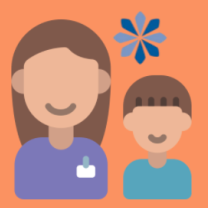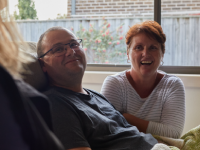Motor Neurone Disease. It is a long name and for short it is called MND.
When mum, dad or someone special in the family has it, it can often be difficult to find the right words to talk about it with toddlers and young people.
Not many people get this illness and some adults you talk to may never have heard of it or know little about it.
We have tried to answer some of the questions you may have about MND, including:
What is MND?
In the human body, there are lots of muscles, and we use many of these to move. But before muscles can move they have to receive instructions or messages from the brain. The messages are sent to the muscle by nerves. These nerves are like the power cords which carry electricity to operate the appliances in your house.
So, if you want to kick a ball, a message is carried from your brain, along the nerves to the muscles in your leg to tell them to kick. This happens very quickly, and you can't feel the messages going through.
When someone has MND, something goes wrong with these nerves, which are called neurones. Gradually, fewer and fewer messages get through, and the muscles will not be able to move at all however hard the person tries.
What parts of the body are affected by MND?
The main effects are on the muscles in the legs, arms, mouth and throat, but not everyone has all these problems.
People who have problems moving their legs may have difficulty walking, standing or climbing stairs. They may also find it hard to keep their balance and may fall. To help them get around they may need a stick, or a frame and in some cases a wheelchair.
Those with problems in the arms and hands may find it difficult to hold and carry things. They may be unable to cook, use tools or take their cloths on and off. Some people cannot move their arms at all.
We use a lot of muscles in the mouth and throat when we eat and talk. For some people with MND it is these muscles that are affected. It may be difficult for them to talk clearly. Their voices sound strange and it may be hard to understand what they are saying. They may need to write down what they want to say or may need equipment, such as a computer, to help them to communicate.
Others may find it difficult to eat and drink. Because of this they may have specially prepared food and need to eat very slowly. They are often worried that food will go down 'the wrong way' and start them coughing.
What are other ways MND may affect people?
MND affects people's bodies in different ways and so nobody can say exactly what will happen next. Most people with MND get tired quickly and need to rest a lot. Some find the illness makes them cry easily. Others find it makes their laugh sound strange.
People sometimes get angry when they cannot do simple things for themselves, like getting dressed, going to the toilet, or scratching an itch. They may become irritable and cross as they have to ask for help. Lots of things stay the same when people have MND. They feel pain when they are knocked or have to sit in one place for a long time. They can hear....see...and smell. Even if talking is difficult for them they may find other ways of letting you know what they want to say, perhaps by a hug, a frown or a smile.
What causes it?
We don't know, but a lot of research is going on to try to find out. We do know that it is not catching. Nobody can cause MND in another person or make them get worse. We all think hurtful thoughts, or say horrible things to other people sometimes, but this will not give them MND.
Will I get it when I am an adult?
It is very unlikely that you will get MND. Scientists and doctors are working very hard to try to find out what causes MND. Hopefully, in time, we will be able to prevent people getting MND.
Do people die because they have MND
People with MND do not get better. Sadly, it is an illness from which people die. We do not know how long people will be ill as MND varies a great deal from one person to another.
Your Feelings
When your Mum or Dad or someone special has MND it is natural to feel sad when you remember how they used to be. Sometimes you feel so sad that you want to cry. Don't feel ashamed or try to bottle it up. We all want to cry when we're upset. Your parents may cry too, when they are sad, even if you don't see them doing it.
You may find that the grown-ups in the family seem to be thinking of something else when you are with them. They may often seem sad or upset. They are probably worrying in their own way about what is happening. Do not think that you are the cause of their upset. They have not stopped loving you.
You may be worried and afraid because you don't know what is going to happen. You may be frightened to ask questions. But it is OK to ask questions. Try to talk to your Mum or Dad, or perhaps you have an uncle, aunt or another adult outside the family you could talk to. Talking often helps and it is one way of letting feelings out. It also lets the adults know how you feel... and that is important.
Perhaps someone has already spoken to your teacher at school and told them about your Mum's, Dad's, or someone special's illness... try talking to your teacher if you are worried. Don't forget that the MND Association is there to help you as well as adults.
You can't be sad all the time. Don't feel guilty when you are happy. Try to have fun as you used to - it's important, and it is good for the person who is ill to see you enjoying yourself.
At times you may feel angry; the person with MND is getting all the attention and their illness seemed to have changed everything. But then you may feel guilty for feeling angry. You may be mixed up inside and not know why.
We all feel angry at times when life doesn't go as we want, and we have to learn to cope with these feelings. It causes hurt if we lash out at someone, so it is important to look at other ways to get rid of these feelings. Play with your friends, listen to your favourite music, draw or write a story or poem - they are all good ways to feel better.
Your parents will not want the illness to affect your life, of course, it does in many ways. You may not want your friends to come around to the house as you feel embarrassed about the way the person has changed because of MND. But your best friends will understand if you tell them about the illness. You might want to tell your friends about this web site so they can understand more about MND.
Things to do in the Future
Knowing that your Mum or Dad or someone you love is not going to get better is sad, and hard for you. There may be things you can do to make your time together special.
You may find small but important tasks you could do for them and perhaps you could make a scrapbook of photographs and stories about the things you have enjoyed doing and the happy times you have had together. You will be able to look at this book later and remember how much you loved each other. Nothing will ever be able to take away these memories from you.
To find out more you can click on the links above.

MND National Youth Hub
A young carer is a person between 5 and 24 years of age who is connected to a person living with Motor Neurone Disease (MND). This may be a friend or family member.
Young carers play a big part in the journey of someone diagnosed with MND, and they need a robust support network. The MND National Youth Hub provides information, useful links and resources for young carers ages 5 to 24 years old to add to their carer toolkits
For further information or to register, please contact info@mnd.org.au or call our info line service P: 9830 2122.
For more information on the National Youth Hub, please contact us at info@mnd.org.au or call us on 1800 777 175
You can visit MND New South Wales website for additional information.
Information for Adults
If you know a child or young person who knows someone with MND, you may like to link through to the National MND Australia website (resources) and download the booklets from the Talking with Young People about MND information pack. This resource will help parents to talk about MND with their children. The series includes booklets for: parents (how to keep communication with children strong - 20 pages), 8-12 year olds (8 pages), teenagers (20 pages), young friends (8 pages) and schools (12 pages).
Acknowledgments: The Motor Neurone Disease Association of Victoria is indebted to MNDA UK for their approval to reproduce much of the "Just for kids" text. In particular, we wish to thank Sue Morley (Regional Care Adviser, MNDA UK) for her work in compiling the information and the comments of parents, carers and other colleagues.
Other Links and Resources

Connect with Others
Are you interested in having contact with others living with MND? MND Victoria can assist people with MND, carers, family members and friends to get in contact with others in similar circumstances via phone, email, and video conference.
Read more
Zooming with Dan
Zooming with Dan episodes are casual and informative chats with a wide range of people within the MND community. Whether it be people living with MND, carers, researchers, MND Victoria staff, allied health professionals, volunteers or any one else that plays a part in the MND space.
Read more